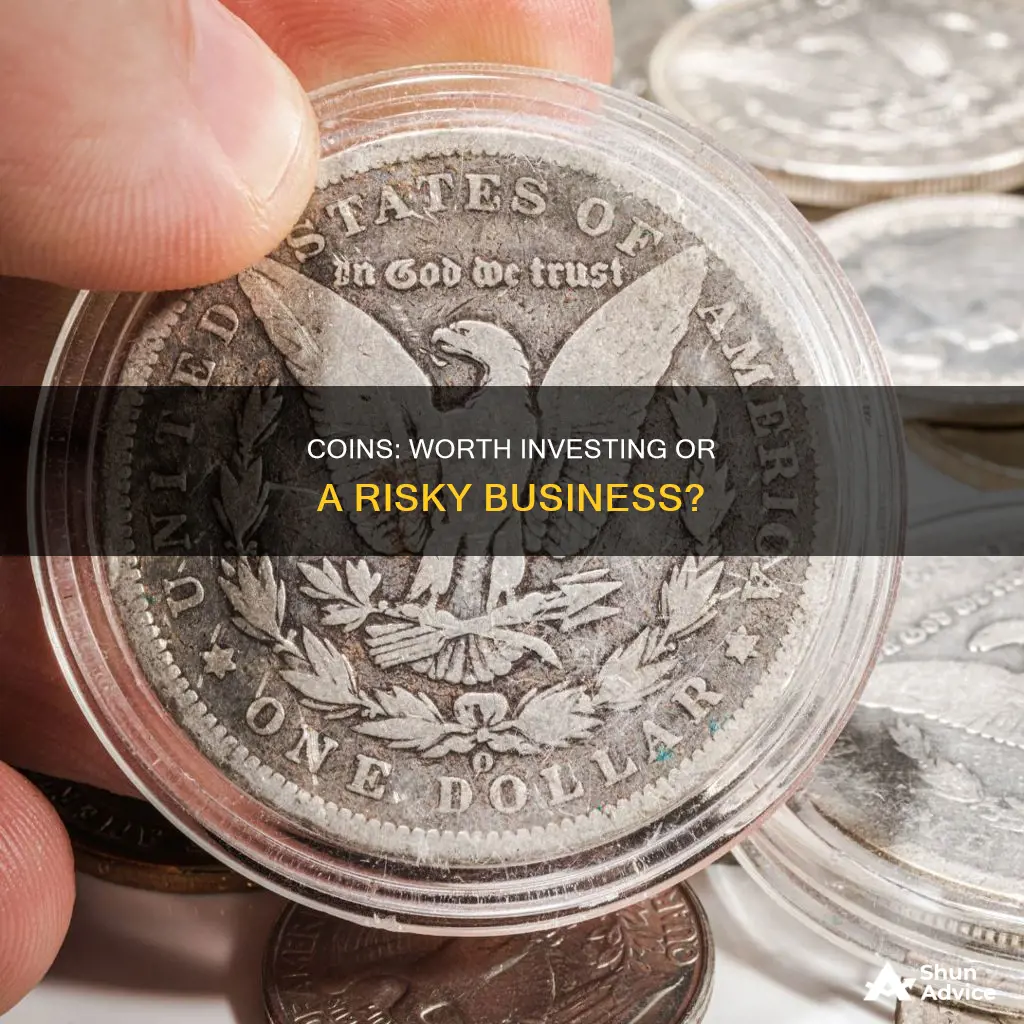
Investing in coins can be a profitable venture, but it is important to understand the risks involved. Coins derive their value from their bullion or collector's value. The bullion value of a coin is determined by the physical metal it contains, usually precious metals such as gold or silver, while the collector's value depends on factors such as age, rarity, and condition. Rare coins can be a good way to diversify one's portfolio, but they are not ideal for short-term profits as it takes time to earn money from investing in them. The coin market can be volatile, with prices fluctuating based on supply and demand. Additionally, there is a risk of counterfeit or doctored coins, so it is important to buy from reputable dealers and have the authenticity of the coins verified. While investing in coins can be lucrative, it is also important to remember that it should be a fun hobby, and one should not give up on collecting coins with historical or aesthetic value just because they may not be the best investments.
| Characteristics | Values |
|---|---|
| Profitability | Rare-coin investing can be profitable in the long term |
| Time | Earning money from investing in rare coins takes time |
| Portfolio diversification | Coins can add diversity to a portfolio focused on stocks and bonds |
| Market trends | The value of coins is not tied to market trends |
| Coin rarity | The rarer the coin, the more valuable it is |
| Coin demand | The demand for a particular coin can influence its value |
| Coin grading | Grading coins can help remove some of the risks of investment |
| Coin knowledge | It's important to familiarize yourself with how coins are valued |
| Coin value | The value of a coin can depend on subtle differences |
| Counterfeit coins | Beginners may be fooled by counterfeit or doctored coins |
| Coin storage | Gold coins should be kept in their cases, away from scratches and fingerprints |
What You'll Learn

Rare coins can be a profitable long-term investment
The rarer the coin, the more valuable it is. The value of a rare coin is influenced by factors such as demand, supply, and the condition of the coin. For example, a coin with a low mintage or one that is in close-to-uncirculated condition will likely be valued higher.
Investing in rare coins can be a complex process that requires knowledge and expertise. It is important to do your research and understand the market before making any investments. One way to do this is by finding a mentor who can guide you through the process and help you identify rare coins with high potential returns. Additionally, you can attend coin shows, read books and articles, talk to coin dealers, and join coin clubs to gain a better understanding of the rare coin market.
It is also crucial to only buy coins from reputable dealers and to ensure that the coins are certified by a recognised organisation, such as the Professional Coin Grading Service (PCGS) or Numismatic Guaranty Co. (NGC). This will help to minimise the risk of acquiring counterfeit or altered coins, which can be challenging for beginners to detect.
While investing in rare coins can be profitable, it is important to remember that it is not ideal for short-term gains. The rare coin market can be volatile, and it may take time to see returns on your investments. However, with the right knowledge and strategy, investing in rare coins can be a rewarding and interesting hobby that provides long-term financial benefits.
Gold Coin Investment: A Smart Move?
You may want to see also

Coins can add diversity to a portfolio
Coins derive their value from two main sources: the physical metal they contain, and their collector or numismatic value. The bullion value of a coin can be calculated by multiplying the number of ounces of metal by the spot price per ounce of that metal. The collector value depends on buyer sentiment and is influenced by factors such as rarity and the coin's condition.
When investing in coins, it is generally recommended to focus on bullion value, especially when starting out. Modern bullion coins, such as Canadian Maple Leaf silver coins and American Gold Eagle coins, are a great way to get started as they contain high-grade gold or silver, making them excellent precious metal investments. Older coins can also be good stores of bullion value, such as American quarters and dimes minted before 1965, which contain 90% silver.
Some coins, like those from the United States Mint and Royal Canadian Mint, are meant to be collector's items. Limited numbers and the use of precious metals can make them valuable over time. For example, gold and silver coins from the Royal Canadian Mint can be saved and sold at a premium if the price of gold and silver rises.
Coins made from gold and other hard metals can stabilize your portfolio during market declines and safeguard against inflation. However, investing in tangible objects like gold comes with a risk of theft and does not provide dividends or interest payments. It is recommended to keep around 5-15% of your portfolio in hard assets like gold coins, with the majority in growth funds, stocks, or other investments.
If you are considering investing in coins, it is important to do your research and connect with a mentor who can guide you through the process.
Bitcoin Investment: Right Time to Take the Plunge?
You may want to see also

Coins are not subject to market trends
Coins are a unique asset class that can be a good investment option for those looking to diversify their portfolios beyond traditional stocks and bonds. One of the key advantages of investing in coins is that their value is typically not tied to market trends. Unlike securities, the worth of coins is influenced by a range of different factors, with demand being a significant determinant.
The value of a coin is derived from two main sources: its bullion value and its collector or numismatic value. The bullion value of a coin is based on the physical metal it contains, such as gold or silver, and can be calculated by multiplying the number of ounces of metal by the spot price per ounce. Rare and antique coins, on the other hand, derive their value primarily from collector appeal, which is influenced by factors like rarity, age, and condition.
Rare coins, in particular, can provide significant profits over the long term. For instance, prices of elite coins appreciated by more than 1,000% from 1976 to 1980 and by 600% from 1982 to 1989, according to Finest Known, a rare-coin newsletter. However, it's important to note that earning money from rare coins can take time, and the market can be volatile due to fluctuations in demand for specific coins.
While coins can be a profitable investment, it's crucial to approach them with caution. The authentication of rare coins is essential, and investors should be aware of the potential for counterfeit or altered coins. Additionally, the value of a coin can vary subtly based on individual characteristics, making investing in rare coins somewhat unpredictable.
In summary, investing in coins can be a rewarding strategy, especially for those seeking diversification. By understanding the factors that drive coin values and carefully researching the market, investors can make informed decisions about including coins in their portfolios. However, as with any investment, there are risks involved, and it's important to recognise that coins may not always provide short-term gains.
Bitcoin: Late Investment, Missed Opportunities
You may want to see also

Gold coins can stabilise your portfolio
Gold coins can be a great way to stabilise your investment portfolio. Gold is one of the oldest forms of money, and gold coins were first used in the Kingdom of Lydia (now part of Turkey) around 550 B.C. Today, gold is still seen as a prudent way to diversify portfolios.
Gold is a hedge against inflation and a store of value through market ups and downs. Gold's value has been preserved throughout thousands of generations, which cannot be said about paper-denominated currencies. For example, in the early 1970s, one ounce of gold was equal to $35. Today, gold is worth much more, while the purchasing power of $35 has decreased due to inflation.
Gold can also be a safe-haven asset when the economy turns sour, and the prices of stocks and bonds decline. Its price is largely independent of other asset classes, and it has traditionally been a refuge against weakness in the dollar. Gold's price tends to rise when the dollar weakens, making it a good hedge against the dollar.
Gold coins can be a good investment option, especially during times of economic uncertainty. Gold's resistance to inflation and its role as a store of value make it a reliable investment. It is also one of the easier assets to convert into cash, adding liquidity to your portfolio.
However, investing in gold coins does come with some risks and considerations. There are storage and insurance costs associated with physical gold, and gold does not generate passive income like some other investments. Additionally, gold is subject to capital gains tax when sold. Experts recommend keeping gold investments to a maximum of 5-10% of your portfolio.
In conclusion, gold coins can be a great way to stabilise your portfolio by providing diversification, hedging against inflation, and offering a safe haven during economic downturns. However, it is important to be aware of the risks and considerations when investing in gold coins.
The Ultimate Guide to Investing in Dogecoin via Cash App
You may want to see also

Coins can be a risky investment
The value of a coin is influenced by a range of factors, including demand, supply, and the popularity of a particular coin series. For example, if a rare coin with a low mintage becomes popular, its price can soar, but only to crash later if its popularity wanes. This makes the coin market susceptible to volatility and fluctuation, which can be risky for investors.
Additionally, investing in rare coins can be complicated due to the risk of counterfeit or doctored coins. Beginners may be fooled by altered coins, so it's crucial to buy only from reputable coin dealers and have the coins certified by professional grading services.
The time it takes to earn money from rare coin investments is another factor to consider. Rare-coin collecting is typically not ideal for short-term gains, and it may take years for a coin to increase in value.
Furthermore, investing in tangible objects like coins carries a risk of theft, and there are no associated perks such as dividends or interest payments.
The Best Places to Invest in Bitcoins
You may want to see also
Frequently asked questions
The value of a coin is influenced by two main factors: the physical metal contained in the coin, also known as its bullion value, and its collector or numismatic value. The bullion value of a coin can be calculated by multiplying the number of ounces of metal in a coin by the spot price per ounce of that metal. The collector value of a coin depends on buyer sentiment and is influenced by factors such as rarity, age, and condition.
Investing in coins, particularly rare coins, can provide long-term gains and help diversify an investment portfolio away from stocks and bonds. Coins are a fairly non-volatile asset type and can offer significant profit potential. However, investing in coins also has some downsides. It can take time to earn money from coin investing, and there is a risk of counterfeit or doctored coins. Additionally, the coin market can be volatile, with prices fluctuating based on supply and demand.
When investing in coins, it is important to consider the age, rarity, and metal amount and purity of the coins. It is also crucial to trust the authentication of the coins and be aware of the potential for market fluctuations. Buying coins from reputable coin dealers and considering including a mix of bullion and numismatic coins in your portfolio are also recommended. Additionally, finding a mentor or joining coin clubs can be helpful for beginners.







